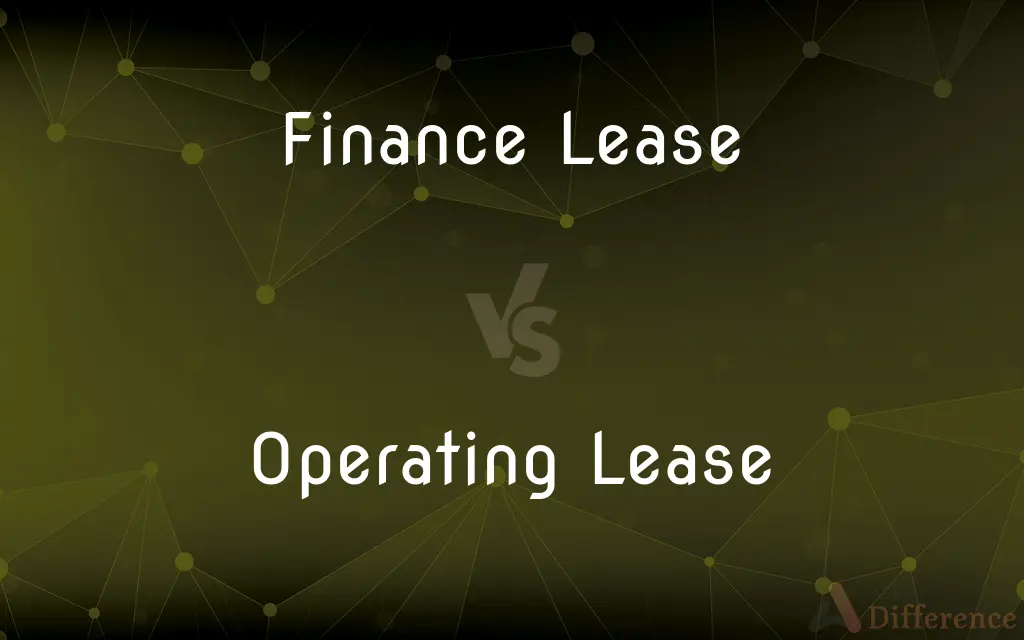Finance Lease vs. Operating Lease — What's the Difference?
Edited by Tayyaba Rehman — By Fiza Rafique — Published on December 28, 2023
Finance Lease is a long-term lease transferring ownership risks/rewards to the lessee; payments cover asset's full value. Operating Lease is a short-term lease where the lessor retains ownership risks/rewards; payments don’t cover asset's full value.

Difference Between Finance Lease and Operating Lease
Table of Contents
ADVERTISEMENT
Key Differences
Ownership: In a finance lease, the lessee effectively gains ownership of the asset over the lease term. In an operating lease, the lessor retains ownership throughout and after the lease term.
Duration: Finance leases typically span most of the asset's useful life. Operating leases are generally shorter, covering only a portion of the asset's useful life.
Financial Commitment: In a finance lease, the lessee is committed to payments that cover the asset's full value. Operating leases involve lower payments as they don't cover the asset's entire value.
Balance Sheet: Finance leases require the asset and liability to be recorded on the lessee's balance sheet. Operating leases often keep the asset off the lessee’s balance sheet.
Maintenance: Under a finance lease, maintenance is typically the lessee's responsibility. In an operating lease, the lessor often remains responsible for maintenance.
ADVERTISEMENT
Comparison Chart
Ownership
Transfers to lessee
Retained by lessor
Lease Term
Long, often asset's life
Shorter, less than asset's life
Financial Commitment
Payments cover full value
Payments cover part of value
Balance Sheet Impact
Asset and liability recorded
Often kept off balance sheet
Maintenance Responsibility
Lessee's responsibility
Lessor's responsibility
Risk and Reward
Shifts to lessee
Remains with lessor
Asset Return
Not typical at end
Usually returned at end
Depreciation
Lessee can claim
Lessor claims
Tax Treatment
Interest expense deductible
Lease payments are deductible
Upgrade Flexibility
Limited
More flexible
Compare with Definitions
Finance Lease
A lease agreement offering a path to asset ownership.
The company chose a finance lease for the machinery to eventually own it.
Operating Lease
A lease with short-term, flexible terms.
They preferred an operating lease for office furniture due to its short-term commitment.
Finance Lease
A lease where the lessee records the asset/liability.
Their finance lease for the new building resulted in a significant liability on their financial statements.
Operating Lease
A lease where the lessor retains ownership risks/rewards.
Their operating lease for the copiers kept maintenance responsibilities with the leasing company.
Finance Lease
A lease where the lessee assumes ownership risks/rewards.
Their factory equipment was acquired under a finance lease, reflecting its value on their balance sheet.
Operating Lease
A lease not covering the asset's full value.
The operating lease for the vehicle involved lower payments as it didn’t cover the car's full price.
Finance Lease
A lease with payments covering the asset’s full value.
They opted for a finance lease, with payments equaling the car's total cost.
Operating Lease
A lease suitable for frequently upgraded assets.
They chose an operating lease for the tech equipment to upgrade easily.
Finance Lease
A long-term lease mimicking purchase conditions.
Opting for a finance lease, they treated the equipment as their own for tax purposes.
Operating Lease
A lease often kept off the lessee’s balance sheet.
Their operating lease for laptops allowed for off-balance-sheet financing.
Common Curiosities
What distinguishes a finance lease from an operating lease?
Finance leases transfer ownership risks/rewards to the lessee, while operating leases keep these with the lessor.
Are finance leases recorded on balance sheets?
Yes, finance leases require recording the asset and liability on the lessee’s balance sheet.
Can you upgrade assets easily under a finance lease?
No, finance leases are less flexible for upgrades compared to operating leases.
Is an operating lease suitable for short-term needs?
Yes, operating leases are ideal for short-term or flexible asset usage.
Are operating leases typically off the balance sheet?
Often, operating leases don’t appear on the lessee's balance sheet.
Who is responsible for maintenance in an operating lease?
The lessor typically handles maintenance in an operating lease.
Can you claim depreciation on assets under a finance lease?
Yes, the lessee can claim depreciation on assets acquired through a finance lease.
Do finance leases offer ownership at the end?
Yes, finance leases often result in the lessee owning the asset at the end.
How does an operating lease affect a company’s leverage?
Operating leases can lower apparent leverage as they might be off-balance-sheet.
Can operating leases provide tax benefits?
Yes, lease payments in an operating lease are usually tax-deductible.
Do payments in a finance lease cover the asset's full value?
Yes, finance lease payments generally cover the asset’s entire value.
What happens to the asset at the end of an operating lease?
The asset is usually returned to the lessor at the end of an operating lease.
Is a finance lease similar to buying an asset?
Yes, a finance lease closely mimics the conditions of purchasing an asset.
Which lease is better for long-term asset use?
Finance leases are generally better for long-term asset use.
Which lease type is riskier for the lessee?
Finance leases carry more risk for the lessee as they assume ownership risks/rewards.
Share Your Discovery

Previous Comparison
Wake vs. Awake
Next Comparison
Estuve vs. EstabaAuthor Spotlight
Written by
Fiza RafiqueFiza Rafique is a skilled content writer at AskDifference.com, where she meticulously refines and enhances written pieces. Drawing from her vast editorial expertise, Fiza ensures clarity, accuracy, and precision in every article. Passionate about language, she continually seeks to elevate the quality of content for readers worldwide.
Edited by
Tayyaba RehmanTayyaba Rehman is a distinguished writer, currently serving as a primary contributor to askdifference.com. As a researcher in semantics and etymology, Tayyaba's passion for the complexity of languages and their distinctions has found a perfect home on the platform. Tayyaba delves into the intricacies of language, distinguishing between commonly confused words and phrases, thereby providing clarity for readers worldwide.
















































